This Biography is about one of the best Physiologist George H. Hitchings including his Height, weight, Age & Other Detail…
| Biography Of George H. Hitchings | |
| Real Name | George H. Hitchings |
| Profession | Physiologists |
| Famous as | Physiologist |
| Nationality | American |
| Personal life of George H. Hitchings | |
| Born on | 18 April 1905 |
| Birthday | 18th April |
| Died At Age | 92 |
| Sun Sign | Aries |
| Born in | Hoquiam, Washington, United States |
| Died on | 27 February 1998 |
| Awards | 1988 – Nobel Prize in Physiology or Medicine
1968 – Gairdner Foundation International Award |
| Personal Fact of George H. Hitchings | |
|
George H. Hitchings was an American doctor who was one of the co-recipients of the 1988 Nobel Prize in Physiology or Medicine. He was renowned for his medical research, especially his groundbreaking work on chemotherapy. His works paved the way for the development of life-saving drugs to treat diseases like leukemia, gout, and disorders of the human immunity system. Born into a loving family in Washington, he enjoyed a happy childhood for a few years before his father was stricken with an incurable illness. After a prolonged battle for his life, he died when George was just 12 years old. The illness and untimely death of his father had a profound impact on the young boy and he decided to become a doctor on growing up. Intelligent and determined, he made his way into the University of Washington as a premedical student in 1923. He found the intellectual atmosphere of the university very stimulating and graduated with a degree in chemistry. After completing his master’s degree, he proceeded to the Harvard University and earned his doctorate. Years later while working for Wellcome Research Laboratories he collaborated with Gertrude Elion and the duo began their work on drug therapies for malaria, leukemia, gout, organ transplantation and bacterial infections. Their extraordinary work earned the pair the 1988 Nobel Prize in Physiology or Medicine. |
|




